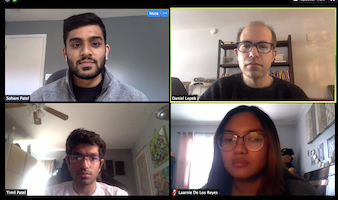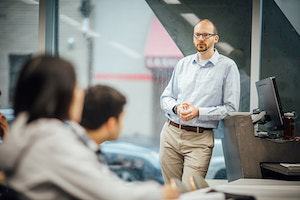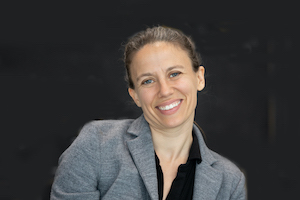Chemical Engineering Faculty Explores Online Teaching Methods
POSTED ON: April 1, 2020

Despite the Coronavirus crisis, classes at The Cooper Union resume this week with the end of study week. All three of Cooper’s schools are finding ways to adjust to the virtual landscape: the Irwin S. Chanin School of Architecture has moved lectures and classes online, and the School of Art continues to offer its Intradisciplinary Seminar and other classes through digital platforms. At the Albert Nerken School of Engineering, faculty are testing ways to make their courses as engaging, rigorous, and interactive as possible. Daniel Lepek, professor in the Department of Chemical Engineering, for instance, is in touch with professors from schools around the world who are making the same adjustments.

“There’s a lot that can be taken away from this experience,” he said in a recent email interview. “It’s pretty interesting that all these schools have managed to go online in such short notice—some had already been doing it, many hadn’t. We have to work together and figure out how to go forward.”
To that end, Professor Lepek has been working on multiple fronts. He’s been conferring with other chemical engineering professors around the world to organize what’s known as Virtual Communities of Practice or VCP’s (he is also currently co-leading a VCP focused on the chemical engineering subjects of transport and separations). During spring break, he helped organize an online webinar that featured two chemical engineering professors from the University of Kentucky, who have much experience teaching in the virtual realm. The focus was to share best practices for effective online teaching to faculty members who are experiencing this virtual world for the first time. And on Monday mornings, Professor Lepek is part of a virtual “coffee klatch” among professors looking to find ways to navigate the educational and academic experience under these current conditions.
Internally, he says, there have been multiple meetings both within and across engineering departments at Cooper as well as regular communication among the chemical engineering faculty. Among them, Professor Jennifer Weiser has found ways to extend digitally-based practices she had already been using in the physical classroom. Using a technique called “handouts with holes,” she gives students in her Drug Formulation and Delivery course lectures missing critical pieces of information. During class, she and students collaborate to deduce the missing information. “I use a Microsoft Surface computer that is wirelessly connected to the projector in the classroom. I can walk around the classroom and take notes on the Surface that are then sent to the projector."
The goal of the “handouts with holes” method is to encourage interaction in the classroom, a far better way of learning than passively memorizing information. In this all-virtual atmosphere, Professor Weiser can still lead the class in this problem-solving approach to learning, but she worries that students will have far few opportunities for collaboration with each other. Then there’s the energy and camaraderie that’s hard to duplicate when students are physically separated. “I’ve been exploring both Microsoft Teams and Zoom for ways to have the students create smaller discussion groups or breakout sessions so they can still maintain those more personal interactions and then contribute to the larger classroom conversation,” she said.

On the other hand, her colleague Professor Ben Davis has found that at least one of his courses is easily translated to a virtual classroom. Professor Davis teaches the senior ChemE class, a capstone course in which students design a chemical plant. This year, he has asked the seniors to design and evaluate one of two schemes for a plant manufacturing crude oil derived from plants.
So far, he’s found that the design of the course works well on an online platform. “The format for the class is that students are consultants in an engineering design firm and they are reporting to their supervisor every other week in meetings (which are now virtual) and to their client at a venture capital firm every other week in presentations (also now virtual).”
But even when a course can be converted to the digital format, according to Professor Lepek, there are a lot of factors to consider: “Are students in the same time zone? Do they have access to the course materials? Do they have the internet resources available?”

Some of Professor Amanda Simson’s chemical engineering students conduct laboratory research, so she has had to refocus their work for the remainder of the semester on mining information from existing studies. “Sometimes there is more interesting work that can be found in old data – so that’s something we are going to look into,” she noted.
She and her colleagues have not only had to redesign course materials; they’ve had to reassess grading systems. She’s turning to digital resources to give exams to students in her now virtual Thermodynamics and Reaction Engineering class. She said, “I’m hoping to get a specific software to do multiple choice answer submission online with additional explanations submitted immediately after the exam.”
In the meantime, Professor Simson, whose cat Simba has become something of a Twitter sensation among Cooper engineering students during this quarantine, is looking for ways to celebrate the work of her master’s students, one of whom will be completing his thesis this semester. “We’re getting creative right now.”




